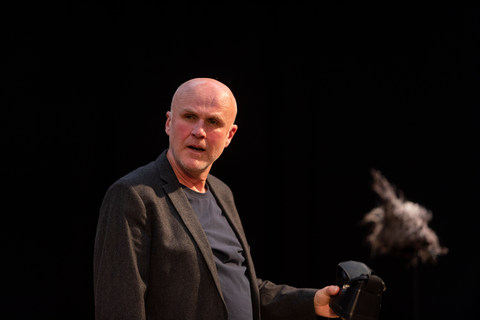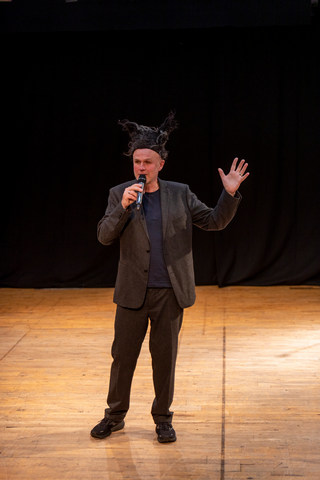Truth’s a Dog Must to Kennel
Tim Crouch's new solo piece combines Shakespeare’s "King Lear" (where the title comes from), stand-up comedy, and the collective experience which is theater.

Tim Crouch as he appears in his play “Truth’s a Dog Must to Kennel” at the SoHo Playhouse (Photo credit: Stuart Armitt)
[avatar user=”Victor Gluck” size=”96″ align=”left”] Victor Gluck, Editor-in-Chief[/avatar]
United Kingdom theater artist, writer and performer Tim Crouch (An Oak Tree, My Arm, ENGLAND, I, Malvolio) has returned to New York with his Truth’s a Dog Must to Kennel, a new piece inspired by the shutdown of the theaters by the pandemic. Part of the International Fringe Encore series being showcased at the SoHo Playhouse, this new solo piece combines Shakespeare’s King Lear (where the title comes from), stand-up comedy, and the collective experience which is theater. It is unusual as a solo piece in that it shifts periodically and requires knowledge of King Lear which may make it difficult for many American theatergoers to follow it.
Crouch enters from the audience and goes up on stage. He picks up a Virtual Reality Headset which he puts on. He then begins to describe the audience at a grander theater, who is where and how much they paid. He then tells us that he is playing the Fool in a modern dress production of King Lear. In Act III, Scene vi, witnessing the blinding of the Earl of Gloucester, he chooses to leave the play having had enough of the bloodshed and the carnage of those days. (In fact, the Fool exiting from Shakespeare, it is believed, because the same actor played Lear’s daughter Cordelia and could not be on stage at the same time.) He goes on to describe the intermission and then the last two acts set in a wasteland of west Britain. He describes a theatergoer who becomes ill and affects other members of the audience in the grander venue. However, it is decided by the management that the performance of King Lear will go on until the final curtain call.

Tim Crouch as he appears in his play “Truth’s a Dog Must to Kennel” at the SoHo Playhouse (Photo credit: Stuart Armitt)
He explains his reasons for leaving the play in the role of the Fool: “…while the world around you is imploding and society is collapsing and the weather’s turned and you’re drenched and can’t feel your toes and so you leave, you leave the storm like a coward, walk out before the interval, before someone gets hurt…” Crouch is remarkable in being able to make his description of the audience, the play and the milieu so vital that one believes one has seen it all even though it has all been narrated description and we have seen none of it depicted.
Periodically, Crouch removes his headset and approaches a microphone positioned on stage. He proceeds to break up the horror of King Lear with stand-up comedy which becomes increasingly dark and upsetting. However, these episodes are totally unrelated to the description of the performance of King Lear. They do prove to be a form of comic relief to the bleak world of Shakespeare’s tragedy. Along the way he reminds us that gathering in theaters is what people used to do, listening to people speaking directly to them, as though the pandemic has made live performance by multiple actors a thing of the past.

Tim Crouch as he appears in his play “Truth’s a Dog Must to Kennel” at the SoHo Playhouse (Photo credit: Stuart Armitt)
The title of Crouch’s play is a line spoken by the Fool in Act I, Scene iv to his master Lear, king of Britain. The complete context reads: “Truth’s a dog must to kennel; he must be whipped out, when Lady the brach (i.e. a female hound) may stand by the fire and stink.” This has been interpreted to mean that the Fool is criticizing Lear for chastising his youngest daughter Cordelia for telling him the truth, while her malicious sisters Goneril and Regan are rewarded for their flattery. (Lear will live to regret this decision.) Unfortunately, this is never referred to in Crouch’s play nor is it explained by him while we are in the theater.
Under the direction of Karl Janes and Andy Smith, Tim Crouch is a very commanding performer, using his resonant baritone to paint pictures with words, holding our attention at all times. Narrating alone he makes us see all he describes from the theater, to the audience, to the landscape on stage and the other unseen actors. However, the play is not for all theatergoers simply because the format is complex and hard to follow and knowledge of the plot of King Lear is mandatory. On the other hand, for those who are into experimental theater, this is an exemplary model of the genre boldly pushing the envelope to what is possible.
Truth’s a Dog Must to Kennel (December 28, 2022 – January 8, 2023)
A Royal Lyceum Theatre Edinburgh production
International Fringe Encore Series
SoHo Playhouse, 15 Vandam Street, in Manhattan
For tickets, visit http://www.fringeencoreseries.com/2022-encore-series
Running time: one hour and ten minutes without an intermission






You managed to explain the content of a play- that was difficult to follow. You gave proper credit to the actor Tim Crouch- but surely this play is not for everyone.